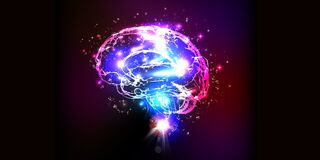Depression
Depression Is Not a Serotonin Deficiency
Why the narrative of a chemical imbalance persists.
Posted May 6, 2022 Reviewed by Tyler Woods
Key points
- The story of depression being a chemical imbalance has grown over 70 years despite a lack of evidence that low serotonin levels cause depression.
- The chemical imbalance story for mood disorders persists for many reasons, several of which may help, but also harm us.
- While medications are useful at times, the public should be informed of drug risks and other effective treatments that have lower relapse rates.
More than 13 percent of adults used antidepressant medications within the past 30 days for depression or anxiety in the United States, between 2015 and 2018. That's more than 40 million people (CDC).
Depression is commonly explained in the doctor’s office, in popular books, and many medical and therapy websites, to be due to a chemical imbalance in the brain. If you take an antidepressant, such as an SSRI (selective serotonin reuptake inhibitor) and symptoms improve, then it is reasonable to conclude that your brain lacked accessible serotonin to feel better and now the balance should be restored.

Although depression is commonly explained this way, research has not supported this theory, or that “correcting” the alleged imbalance resolves depression. I am curious about the narrative of the chemical imbalance and why, as a society, we still believe it. Here are three reasons we may stay hooked to this explanation.
1. It Reduces Stigma and Blame
To start, there may be advantages to believing the brain imbalance story. For some, it reduces the stigma of depression, perhaps by immediately relieving the shame or blame that depression is a weakness, or something to just "get over." The chemical imbalance story helps us not blame the victim; however, it might place blame onto unsuspecting neurochemicals that are just doing the best they can under the circumstances.
While reducing stigma around depression is good, the chemical imbalance story is a limited view, unsupported by research, that may lead us astray and prevent a real understanding of the intricacies of depression. It simplifies what is complex—a digestible explanation, although so far shown to be inaccurate.
2. It’s Convenient

We like tidy, simple, cause-and-effect explanations for problems, especially when we are not feeling well. The chemical imbalance narrative does this for us: it’s convenient. Just right the wrong, fix the broken, balance the unbalanced. It suggests that depression should fall in line with the medical model of illness (which many other illnesses also do not fit neatly into) and concludes that a mechanical solution outside of me will fix me or I’ll stay broken.
Much less convenient would be addressing a life issue such as a family conflict, a difficult or meaningless work situation, marriage, geographical move, or past trauma. These are more complex, confusing, and time-consuming (and potentially more blame-y, see number 1). Getting professional help has not historically been valued as highly as prescriptions, and not as affordable or available, either.
Even larger and more complex are the systems in society that contribute to suicide and addictions, the largest contributors to rising despair and deaths of despair in the U.S. (NAS). Researchers Peter Sterling and Michael Platt examined the reasons behind these rising rates in the U.S. compared to a 16-country control group that has declining rates of deaths of despair. The differences found included many protective communal supports that humans need across a lifespan that the control group countries have and the U.S. does not, including the ease of job changes, affordable childcare, living wages, healthcare, and free time to pursue creative endeavors (JAMA Psychiatry, 2022).
To get to the heart of mood disorders, while inconvenient, we may need to address social disconnection issues woven into a society built around freeways, pills, accumulation of wealth, an ideology of independence, and social media reputations.
3. Advertising
Heavy advertising campaigns and a global market that reached over $26 billion dollars for antidepressants in 2020 have sold the chemical imbalance story for decades. It’s not that medications have been shown ineffective as much as they just haven’t shown to be more effective than placebo in a meaningful way. The public needs to be well-informed about how effective placebo treatment is compared with active-ingredient drugs; which for antidepressants has been found consistently comparable across hundreds of studies and hundreds of thousands of patients (Kirsch, 2019; Stone, et al., 2018).
This information should be just as heavily promoted and available to the public as the ads for medications, along with other beneficial treatments that improve mood without the risks of antidepressants. Psychotherapy and exercise have been found similar in effectiveness and also to have lower relapse rates (Shea, 1992; Babyak, 2000).
While many people heroically pursue treatment for depression via multiple routes, it is still important to be aware of the dominant collective narrative behind what depression is, what helps alleviate it, and why. To move toward healing-informed care, we may want to address our own internal strengths and struggles, and how they relate to our interdependence within a worldwide network. Finally, we can approach the data regarding depression with humility and awe, allowing a more accurate story to unfold.
References
Brody & Gu, (2020). Centers for Disease Control, National Center for Health Statistics, Antidepressant Use Among Adults, United State 2015-2018 https://www.cdc.gov/nchs/products/databriefs/db377.htm
National Academies of Science, Engineering, and Medicine. (2021). High and Rising Mortality Rates Among Working-Age Adults. The National Academies Press. doi:10.17226/25976
Sterling, P. & Platt M. Why Deaths of Despair Are Increasing in the US and Not Other Industrial Nations—Insights From Neuroscience and Anthropology. JAMA Psychiatry. 2022;79(4):368–374. doi:10.1001/jamapsychiatry.2021.4209
Kirsch, I. (2019) Placebo Effect in the Treatment of Depression and Anxiety. Front. Psychiatry, 13 https://doi.org/10.3389/fpsyt.2019.00407
Stone M, Kalaria S, Richardville K, Miller B. (2018) Components and trends in treatment effects in randomized placebo-controlled trials in major depressive disorder from 1979 to 2016. Paper presented at the American Society of Clinical Psychopharmacology, Miami.
Shea MT, Elkin I, Imber SD, Sotsky SM, Watkins JT, Collins JF, et al. (1992) Course of depressive symptoms over follow-up: findings from the National Institute of Mental Health Treatment of Depression Collaborative Research Program. Arch Gen Psychiatry, 49(10):782–7. doi: 10.1001/archpsyc.1992.01820100026006
Babyak MA, Blumenthal JA, Herman S, Khatri P, Doraiswamy PM, Moore KA, et al. (2000) Exercise treatment for major depression: maintenance of therapeutic benefit at 10 months. Psychosomatic Med, 62:633–8. doi: 10.1097/00006842-200009000-00006




